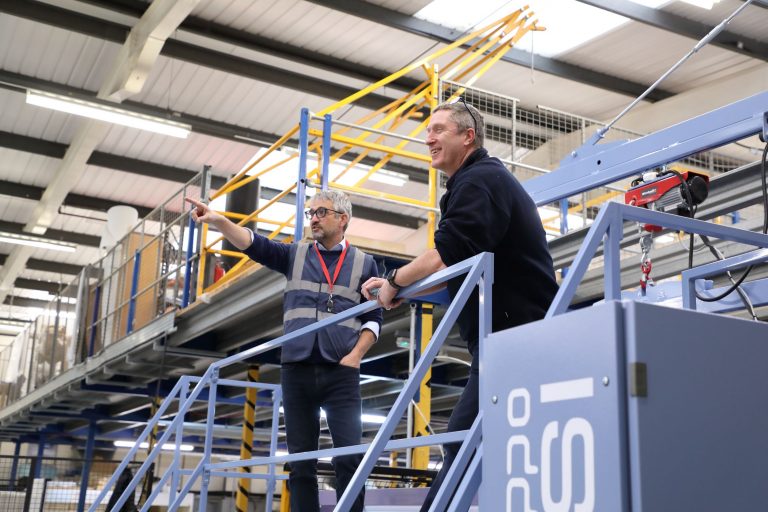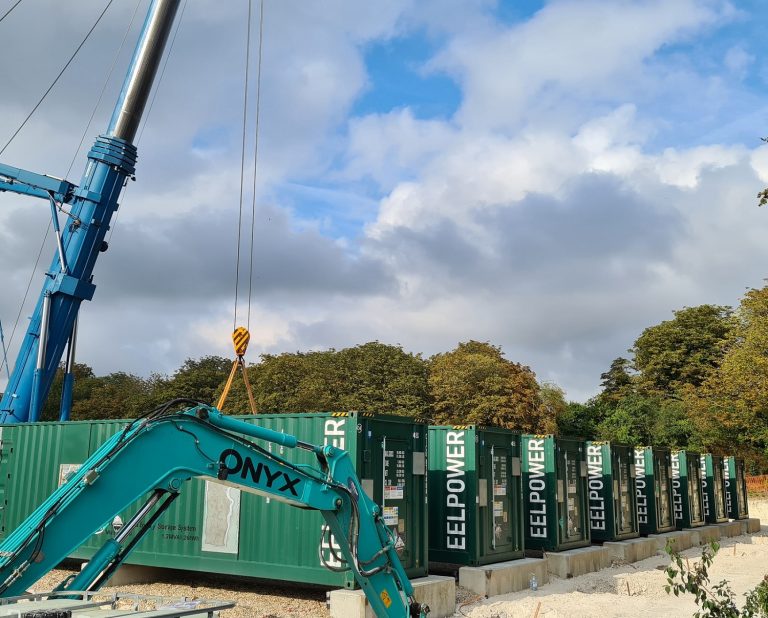Fast-growing Yorkshire mattress company acquires part of complementary Oxfordshire business
GNG Group, the rapidly-expanding West Yorkshire-based business, has acquired part of The Foam Company out of administration, further boosting GNG’s successful medical and consumer mattress division which includes its Komfi vacuum-packed mattress brand.
Located in Abingdon near Oxford, The Foam Company has been making foam, memory foam and latex components for use in furniture for over 30 years as well as being a leading manufacturer of mattresses. It was placed into administration on 28th February 2022 following the withdrawal of a key mattress brand, Mammoth, that it was making under licence.
On 10th March, a deal was completed for GNG Group, an international brand leader and supplier of foam-based products, to acquire the company’s assets and intellectual property.
Headquartered in Wakefield, GNG Group was established in 1987 and primarily serves the medical, consumer and sports sectors. It has grown into a £10m turnover business, employing more than 90 people.
Darren Potterton, managing director of GNG Group, comments: “It is extremely sad to see the demise of such a long-established successful family business. Unfortunately, after the loss of the licence for its major brand, the business was no longer viable as a going concern. We hope to reach out and try to work with some of The Foam Company team in the future.
“We will be integrating the assets within our operations – The Foam Company’s brands are a good fit with our existing range, and the machinery will be relocated to the West Yorkshire manufacturing facilities of our expanding mattress division, supporting our ambitions to we continue to build the business.”
Wake Smith helps bring hottest yoga craze to Sheffield
Europe’s largest yoga business Hotpod Yoga is now available in Sheffield.
The franchise with enthusiast Suzanne Williamson features yoga in a heated 37 degree pod complete with lights, music and fragrance, and is operating from Sheffield city centre.
Suzanne has taken a 10-year lease on a prominent ground floor unit at The Tower on Furnival Square with the help of Sheffield’s Wake Smith Solicitors and fitted out the premises for classes with her team of seven yoga teachers.
Sheffielder Suzanne said: “My background is in hospitality and fitness, and I am looking forward to combining these worlds and welcoming everybody to Hotpod Yoga Sheffield.
“I needed help with rehabilitation after sustaining a back injury playing Roller Derby and stumbled upon Hotpod Yoga.
“One class and I was intrigued, two classes and I was hooked. I felt super chilled after a session but was perplexed as to why Sheffield did not have a Hotpod yet. From then on, I set about making it a reality.
“This is a supercharged approach to an ancient and powerful practice that takes yoga out of its niche and into the lives of people previously untouched by, or uninterested in, yoga. And here it is in Sheffield.”
The concept of Hotpod Yoga is to immerse yourself in the activity inside a pod with a temperature of 37 degrees through the Vinyasa Flow style of yoga which synchronises movement and breath, to work the body and calm the mind. This is complemented with special purple lighting, urban-chill beats and fragrance to awaken the senses.
Hotpod was started in 2013 and has become Europe’s largest yoga business with more than 100,000 people immersing themselves in a Hotpod class at one of more than 50 locations in eight countries around the world.
Tom Weightman, associate in the commercial property team at Wake Smith, dealt with the details of the lease, and said: “This is a real revolution in yoga and Suzanne is looking to attract, and convert, Sheffielders to a new take on yoga. We wish her all the best in her new venture.”
Ursula Lidbetter announces retirement from Lincolnshire Co-op
Lincolnshire Co-op’s CEO Ursula Lidbetter has announced her plan to retire at the end of 2022, after a career with the Society spanning 37 years.
Ursula, who started in 1985 as a buyer and department manager, is in her 18th year as CEO of Lincolnshire Co-op, which has over 220 varied outlets and recorded sales of over £355m in 2020/21.
She’s also been at the helm of major projects including the creation of the Lincoln Science and Innovation Park and The Cornhill Quarter development in Lincoln. She received her OBE in 2019 for services to the local economy.
This year will see Ursula turn 60 and, after almost two thirds of her life working for Lincolnshire Co-op, she feels it’s the right time to retire and spend more time with family.
She said: “It’s a privilege to work alongside my 2,900 colleagues to lead this special business, where we aim to make life better in our communities every day.
“It’s also wonderful to collaborate with many like-minded people in organisations across Lincolnshire and beyond to bring forward schemes making such a difference.
“In due course, I will hand over to my successor who will take us into the next stage of our development.”
Lincolnshire Co-op’s Board of Directors will be conducting a recruitment process for the new CEO over coming months.
Chair David Cowell said: “The Board would like to thank Ursula for the huge contribution she has made to the success of the society during her time here. She will be leaving our co-op in great shape to move on to its next chapter, based upon the strong legacy that has been built over 161 years of trading.
“In the meantime, we have a busy programme of work for 2022 and look forward to delivering this under Ursula’s expert leadership.”
Yorkshire-headquartered Smith Brothers has been appointed by Eelpower to power up its Suffolk battery storage site
Specialist high voltage engineering firm Smith Brothers Contracting Ltd, has been appointed to provide ICP and EPC works at the new battery storage site for SUSI Partners and Eelpower’s joint venture in Halesworth, Suffolk.
Yorkshire-headquartered Smith Brothers will deliver a turnkey solution – from initial design and EPC works to final testing and commissioning. Once complete, the 132kV development will provide over 50MW of flexibility and balancing services to UK Power Networks (UKPN).
Acting as the independent connection provider (ICP), the contestable connection will see the team deliver a complete solution, from initial design and EPC works to testing and connection. Construction will take place later this year and, once complete, the development will be connected to UKPN via 250m of 132kV cabling.
Further to undertaking the contestable works as the ICP, Smith Brothers Contracting Ltd is responsible for all engineering, procurement, and construction (EPC) works too – including balance of plant for the battery storage site.
Smith Brothers will receive, install, and commission the 28 battery storage units – as well as construct the supporting infrastructure for each, including AC and DC cabling across the whole site with project-specific SCADA panels for the customer to be able to remotely control the whole site.
“We’ve worked with Eelpower before and delivered successfully on similar schemes” explained Smith Brothers contracts manager Alan Hoyle. “The project is a vital investment into the region’s long-term energy future – and Smith Brothers will ensure that the work is completed on schedule and within budget.”
The delivery isn’t without challenges though, given “the relatively small footprint of the site means that construction work and site access needs to be well-managed,” continued Alan.
Mark Simon, Eelpower CEO, added “Halesworth will be the first English 50MW that the SUSI Partners and Eelpower JV will energise later this year. Smith Brothers have proved to be the sort of excellent and responsive partner on which we, and the nation’s electricity system, relies to deliver the energy transition. We look forward to working with them more in future.”
February 2022 insolvency statistics, R3 response
Eleanor Temple, chair of insolvency and restructuring trade body R3 in Yorkshire and a barrister at Kings Chambers in Leeds, responds to today’s publication of the February 2022 corporate and individual insolvency statistics for England and Wales:
“The monthly fall in corporate insolvencies is being driven by a reduction in all types of corporate insolvency process, with the exception of administrations, whose numbers increased to a 15 month high.
“This increase suggests that there are a number of insolvent businesses which have some prospect for rescue, given this is one of the main statutory purposes of the administration process. Wherever possible the insolvency profession will work to secure the rescue of businesses in administration to help ensure better outcomes for the business, its staff and its creditors.
“However, despite the month-on month-decline, the figures released today show corporate insolvency numbers were higher than this time last year and the year before – and that levels of corporate insolvency have remained at pre-pandemic levels.
“Sadly, the ending of the peak of the pandemic and the lifting of the final set of restrictions hasn’t led to the shot in the arm the business community had hoped for. Although the economy grew in January and firms benefited from restrictions ending in February, it took time for footfall to increase – and will take a while before anything resembling normality returns.
“Consumer spending has declined and consumer confidence is low as people worry about the economy and their own financial position, with inflation now a real problem for firms and individuals alike. This situation is unlikely to improve any time soon given the impact the war in Ukraine will have on energy costs.
“In addition to this, the restrictions on using winding-up petitions are coming to an end later this month – something which could see an increase in creditors turning to legal action to recover unpaid debts.
“Now is the time for directors to be alert to the signs of financial distress and to take action if they show themselves. We know conversations about a business’ financial position are some of the hardest to have, but speaking up about your concerns at an early stage typically leads to a better outcome than if you’d waited until the problem worsened.”
Personal insolvency
“The increase in personal insolvencies is being driven by a rise in Debt Relief Orders and Individual Voluntary Arrangements. This suggests that more people are looking for help with resolving their financial issues and to come to an arrangement to manage their debts.
“It’s clear that the economic issues of the last two years are starting to take their toll on people’s financial health. In addition to the issues created by the pandemic, rising fuel and energy costs are a big concern for many and wages are failing to keep pace with inflation. As a result, there are a lot of people who are worried about their financial prospects in the months ahead.
“Our message to anyone in this position is simple: seek advice as soon as possible. The earlier you do, the more potential options you have to resolve your situation, and the more time you have to take a decision about how you move forward.”
BOOST&Co doubles Yorkshire presence to accelerate regional SME funding support
BOOST&Co, which provides funding to UK SMEs, is continuing to grow its regional presence as it appoints Michael Collins to the Yorkshire team as business development manager. The addition comes after a period of significant growth for the business, across the entirety of its UK deal-sourcing team.
Collins, who was previously at Metro Bank, will be based in Leeds, working alongside principal Adam Fearnley to drive deal activity in Yorkshire and the North East, helping even more SMEs achieve their funding ambitions. Collins will operate across both BOOST&Co and its sister company, Growth Lending, and will be the first deal-sourcer in the region representing Growth Lending.
Commenting on his appointment, Michael Collins says: “I wanted to join the BOOST&Co team because of its agile and ambitious approach to supporting the UK SME market. I’m really glad to be working for such an innovative company and having the ability to also work with colleagues across the wider Growth Lending Group is a unique opportunity that will enable me to support businesses with both their working and growth capital needs.
“I look forward to contributing to the continued growth of the group, while delivering funding to great, local SMEs and mid-market firms.”
Adam Fearnley, BOOST&Co’s Leeds-based principal, says: “The Yorkshire region has seen significant economic growth and benefits from a wealth of high-quality, fast-growing businesses across a range of sectors and is supported by a well-established and experienced M&A community. Given these characteristics, we see the region as being well-aligned to our funding proposition and a key source of deal flow.”
Harrogate managed IT service provider acquires Scottish security consultancy
Harrogate-headquartered managed IT service provider, Redcentric, has acquired 7 Elements Limited, a provider of security testing, incident response management and bespoke security consultancy services, in a deal worth up to £2.4m.
7 Elements works closely with customers to assess security threats, identify weaknesses and deliver tailored solutions to protect customers. The acquisition enhances the Redcentric service portfolio with additional capability within the security market.
7 Elements has annualised revenues of c.£1m and EBITDA of c.£0.3m.
While 7 Elements is now a key part of the Redcentric group of companies, it will continue to operate as a standalone business and will continue to be led by its former owner, David Stubley, who established the business in 2010.
Under the terms of the agreement, £1.95m initial consideration was paid in cash on completion, with a further earn out payable in cash based on the future performance of the business over the next thirteen months. The maximum potential consideration payable is £2.4m.
Peter Brotherton, Chief Executive Officer, Redcentric, said: “I am delighted to welcome 7 Elements into the Redcentric family. The addition of its services to Redcentric’s existing DDOS, SIEM, managed WAF and information security consultancy services means we are now able to offer a complete portfolio of security services to our customers. I’m very much looking forward to working with David and the 7 Elements team to help ensure our customers are secure.”
Lincolnshire councils urge residents to offer accommodation to support Ukrainian refugees
Lincolnshire councils are encouraging those who can, to step forward with an offer of accommodation and help in supporting the resettlement of Ukrainian refugees into the County.
Following the government’s announcement of its ‘Homes for Ukraine’ scheme through which people are asked to provide homes or a spare room rent-free for as a long as they can, any willing hosts can now register to take in refugees at www.gov.uk
There will be a process of vetting, security checks and matching offers of accommodation against the refugee families and individuals with an expectation of the accommodation being for a minimum of six months. Hosts will be paid £350 a month per resettlement group.
While precise details of the visa process and sponsorship scheme are awaited, it is clear that under the scheme, Ukrainians who are matched and housed with a UK ‘sponsor’ will be granted leave to remain for three years.
They will be able to work, claim benefits and access public services in that time.
All current details about the scheme are available on the government website and any further local specifics will be posted on each Lincolnshire councils’ local websites.
Additionally, working in partnership with all Lincolnshire councils, the Lincolnshire Community Foundation has launched an appeal dedicated to supporting those arriving in the county. This Local Welcome Fund which will help to meet additional costs and provisions required by the refugee families and their hosts, such as to access transport, broadband and digital resources, access to leisure facilities, vouchers for toys etc. It is at: www.totalgiving.co.uk/appeal/LincolnshireCF-Ukraine
Committed to jointly contributing in every way they can in supporting the resettlement of Ukrainian refugees, the Leaders of Lincolnshire’s district, city, borough and county councils said:
“The tragedy unfolding in Ukraine is on a terrible scale and it is heart-breaking to see families having to flee their own country with few possessions and little means of support. We know that, as it always has, Lincolnshire will extend a warm and generous welcome to displaced Ukrainians and that both as individuals and communities we will do whatever is needed locally to help with this humanitarian crisis.
“We encourage anyone who has the capacity to open up their homes or make available their properties to do so, in order that we can offer safety and sanctuary to those in need.
“Additionally for everyone who can, to respond through financial help and generosity of goodwill to ensure that when our guests do arrive they can be provided with everything they need in order to settle, feel safe and rebuild their lives as best they can.
“Working together, and in partnership with other public bodies, charities and organisations, there is a lot of positive work going on as we stand ready to respond in every way we can.”
Already 50-or-so offers of accommodation have been made, offers which will now be redirected to the government site.
Announcing the ‘Homes for Ukraine’ scheme, Housing Secretary Michael Gove Mr Gove said that he anticipated tens of thousands of Ukrainians might be taken in by UK families with the first arrivals within a week.
In a later phase of the scheme, organisations such as charities and churches will also be able to sponsor refugees, with details to follow.
- There is a further programme through which Ukrainians resident in the UK, or UK-residents can take in family members fleeing from Ukraine. Details at www.gov.uk/guidance/apply-for-a-ukraine-family-scheme-visa
- For an overview on ways to help, see: www.gov.uk/government/news/ukraine-what-you-can-do-to-help
- Working together through a local charity or faith group, communities can collaborate as ‘community sponsors’. For detail email: communitysponsorship@homeoffice.gov.uk
- Private landlords, businesses and property owners willing to offer up homes in Lincolnshire for those seeking sanctuary are invited to email LincsResettlementPartnership@n-kesteven.gov.uk
- Donations of money are encouraged to organisations or community groups that demonstrate an understanding of community needs, safe and legal working practices, and systems of accountability. These include:
- https://www.totalgiving.co.uk/appeal/LincolnshireCF-Ukraine
- Disaster Emergency Committee website
- British Red Cross: Humanitarian aid in Ukraine website
- MSF Doctors Without Borders website
Sheffield synthetic data platform provider raises $3.7m
The Sheffield-based company behind a platform for the creation of synthetic training data for AI vision systems has raised $3.7m (£2.8m) through a new investment round.
Mindtech Global has completed a strategic investment round led by Appen, a specialist in data for the AI lifecycle.
The latest investment round, including participation from Appen and existing Mindtech investors, follows a $3.25m funding round in July 2021 and will be used to support the company’s rapid growth.
The July 2021 investment round for Mindtech Global was led by NPIF – Mercia Equity Finance, which is managed by Mercia and is part of the Northern Powerhouse Investment Fund (NPIF), with Deeptech Labs and In-Q-Tel participating.
In addition to the new investment, Appen and Mindtech have formed a commercial partnership to provide a range of real and synthetic images and associated data and metadata annotation services to the market.
Mindtech’s Chameleon platform is expected to be complementary to Appen’s existing data and annotation services.
Chameleon’s ‘no-code’ platform is designed for the creation and automated annotation of synthetic data to train human-to-human and human-to-world AI applications. It is designed to help computers understand and predict human interactions in applications ranging across retail, smart home, healthcare and smart city.
Mark Brayan, Chief Executive at Appen, said: “Synthetic data is an invaluable resource in the training of AI models and when combined with real-world data can enable outstanding results. We’re excited to partner with Mindtech as their automated end-to-end end synthetic data platform produces the right synthetic data for our customers, faster than competing solutions.”
Steve Harris, Chief Executive at Mindtech, said: “We’re excited about this strategic partnership with Appen – it’s going to enable more customers to rapidly train their AI systems on scalable synthetic data while complementing Appen’s existing products in real-world data collection, management and annotation.
“By working in partnership, we’ll further accelerate the development of AI systems that better understand how humans interact with each other and the world around them.”
Solar energy trade body welcomes growing cross-party support
The Chief Exec of trade body Solar UK has welcomed growing cross-party support for accelerated change to renewables.
Chris Hewett, Solar Energy UK’s Chief Executive, said: “Solar can and will make a huge contribution to UK national energy security and self-sufficiency while addressing climate change head-on. It is also the quickest of all renewables to deploy.
“There is turmoil in the energy markets caused by events worldwide. Now is the time for the UK to follow all other major economies across the globe to formally adopt the net-zero compliant target for solar. For us, that means the trebling capacity to 40GW by 2030 with similar growth in the following decade. The entire energy industry supports this target, and the solar industry can deliver it.
“Deploying 40GW of solar by 2030 would reduce bills for consumers, help businesses to grow while cutting their carbon emissions, and provide clean energy for the country and the planet. It would also create thousands of high-quality green jobs around the country,” he added
The UK will need to deploy at least 40GW of solar by 2030 to achieve a net-zero economy by 2050. Doing so will require installed solar capacity to triple over the next decade, with an average annual installation rate of 2.6GW.
Solar Energy UK expects 10% of this to be deployed in Scotland. This will be a major challenge, even with the solar industry demonstrating strong growth. “Our analysis shows that the UK can both set and achieve a deployment target of 40GW of solar power in the UK by 2030 – this would accelerate the decarbonisation of the British economy, demonstrate global leadership in renewable energy, and create green jobs and investment.”












